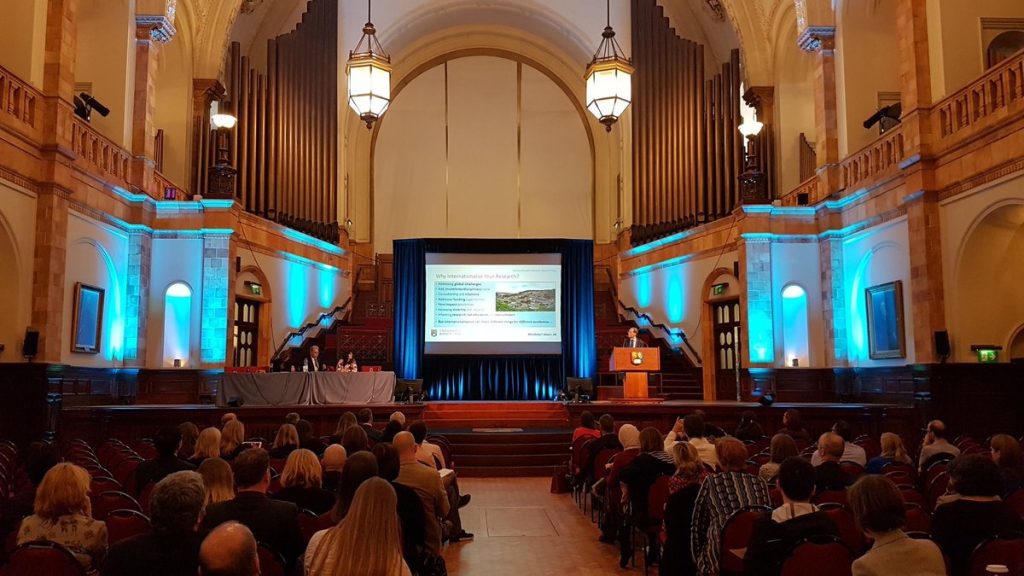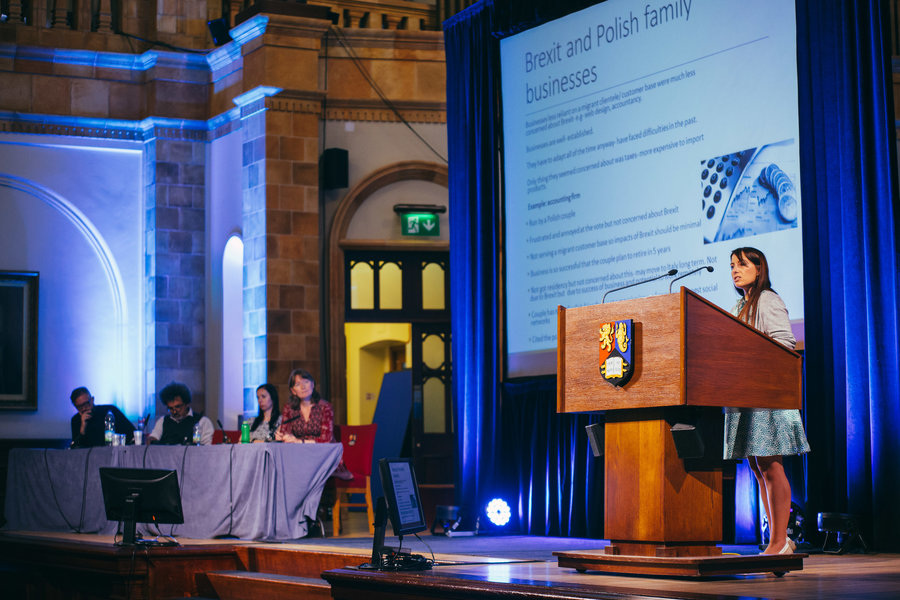On 26th September 2017, the University of Birmingham held their first research conference. The theme was ‘Research Futures’ and provided an opportunity to discuss open research questions whilst exploring current issues around the delivery of effective & impactful research. It was aimed at the University’s academic staff, and staff supporting research. City REDI’s Catherine Harris and Chloe Billing were both speakers at the conference.
‘The Future of Britain: ‘Brexit’ as an Opportunity for UK Research’
Catherine Harris (City REDI Senior Research Fellow) presented in a session on Brexit, which explored current research into Brexit at the University of Birmingham. The session was chaired by Professor Karen Rowlingson (Director of Research College of Social Sciences, University of Birmingham). Other speakers in the session were Dr Kelly Hall (Social Policy, University of Birmingham), Dr Chris Allen (Social Policy, University of Birmingham) and Dr Nando Sigona (Deputy Director of IRIS, University of Birmingham).
 Catherine’s paper explored the responses to Brexit of EU entrepreneurs in Birmingham. Her paper explained that, in the wake of Brexit, EU migrants face not only an uncertain future as UK residents and employees, but also as employers. For instance, EU employers may find the business and social climate becoming increasingly unfavourable at a time when economies in the former EU Accession countries are on the ascent. Focussing on families which run businesses and originate from Poland and the Baltic States, the presentation explored the lived experiences of life and work in Birmingham for the individuals and their children. It also considered future aspirations and investment decisions, and how these have been affected by the Brexit process.
Catherine’s paper explored the responses to Brexit of EU entrepreneurs in Birmingham. Her paper explained that, in the wake of Brexit, EU migrants face not only an uncertain future as UK residents and employees, but also as employers. For instance, EU employers may find the business and social climate becoming increasingly unfavourable at a time when economies in the former EU Accession countries are on the ascent. Focussing on families which run businesses and originate from Poland and the Baltic States, the presentation explored the lived experiences of life and work in Birmingham for the individuals and their children. It also considered future aspirations and investment decisions, and how these have been affected by the Brexit process.
The presentations were followed by discussions about how research on Brexit should be disseminated to policymakers, future research possibilities and how to research a constantly evolving process such as Brexit.
More PIE Please! (Publications, Impact Case Studies, Engagement) How Engaging With Business Can Improve Our Research
Chloe Billing (City REDI Research fellow) was also a panellist in a Business Engagement session, which focussed on why it is becoming more and more important for academia to collaborate with business. The discussion was chaired by Andy Newnham (Business Engagement Partner) and involved three other panel members: Dr Kai Bongs (lead of the Midlands Ultracold Atom Research Centre); Karen Croft (a research commissioner from Aston Villa Football Club); and Hilary Smyth-Allen (the Exec Director of Business Professional Services Birmingham). The context behind the session was that more and more research funding is coming from business and not just funding for engineering and medical science, but also for Social Sciences. In fact, one of the largest research grants (£2.5M) from industry at the University last year was in Social Sciences.
At the start of the session Chloe and Kai shared their experiences on the benefits of collaborating with Industry, both in terms of strengthening their research outputs and also their REF impact cases. Karen and Hilary then outlined the advantages of working with universities from a business perspective, with reference to expertise and also skilled graduates. The challenges of external engagement were then discussed. For example, one challenge for businesses is that academics may work on different time scales to them. For the academics, one challenge is that relationships with business partners may influence objective research recommendations from being made. In the Q&A session an audience member also warned of the time and resource demands from collaborating with businesses and how these inputs cannot always be clearly attributed to REF impact case studies. In response to this the Business Engagement team pledged to provide more guidance on tracking different forms of engagement with industry and better support on identifying best practice approaches to high impact cases.
To sign up to our blog mailing list, please click here.

